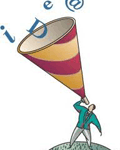New mail from USA. By Linda Nordstrom (leggi in italiano)
Consider it an inauguration of sorts, a celebration of the e-book industry becoming a member of the major media club just as digital music and online video have before them. When you influence a billion dollars, people have to take you seriously. In the book business, it means that traditional publishers can no longer live in deny-and-delay mode; meanwhile, digital publishers get invited to better parties and people in other media businesses like TV and magazines look over and wonder if they could cut a slice of this new pie just for them.
To honor the occasion, in Forrester Research they have just published our five-year forecast for eBooks in the U.S. The punchline is this: 2010 will end with $966 million in e-books sold to consumers. By 2015, the industry will have nearly tripled to almost $3 billion, a point at which the industry will be forever altered.
Right now, the number to track – and the one that determines how many e-books will sell – is the percent of a consumer’s books that are bought and consumed digitally. To get at this number, we have to understand how people get books today. Did you know that the two most common ways people get books today is borrowing them from a friend or getting them from the library? Evidently content – at least in the book business – is already quite free, even without the help of digital.
e-book buying falls very low down on this list of how people acquire books. Just 7% of online adults who read books read e-books. But that 7% happens to be a very attractive bunch: they read the most books and spend the most money on books. And here’s the kicker – the average e-book reader already consumes 41% of books in digital form. Oh, and that includes the people who don’t have an e-reader yet, which is nearly half of them. For those that have a Kindle or other e-reader, they read 66% of their books digitally.
I’m sure you’re ahead of me on this one, but let’s just spell it out. We have plenty of room to grow beyond the 7% that read e-books today and, once they get the hang of it, e-book readers quickly shift a majority of their book reading to a digital form. More e-book readers reading a greater percentage of their books in digital form means our nearly $3 billion figure in 2015 will be easy to hit, even if nothing else changes in the industry. Meaning even if we never get color e-Ink screens, if publishers never experiment with e-book subscriptions, and interactive e-book formats never succeed, we will still see digital get close to $3 billion in size by the middle of the decade.
At that size and higher, not only do publishers need to take digital seriously—they must make it the new default for publishing, preparing for a day in which physical book publishing is an adjunct activity that supports the digital publishing business. And this dramatic reversal will have happened faster in book publishing than in any other media business. Not just because publishers have had years to watch other media industries face the digital transition, but also because book publishing is a single-revenue business.
Music used to generate revenue from the radio, from CD sales, and from concert tickets. Changing that business required upsetting several apple carts at once. TV is similarly complex, revenue is derived from advertising, cable carriage or retransmission fees, and direct sales of DVDs. You can’t go digital without first rethinking the entire business (and not every player in the ecosystem takes that lying down). But not publishing. Books are published and sold at retail. In the end, once the only channel from which revenue is derived starts to get remodeled, it’s not long before the whole structure gets torn down and rebuilt to accommodate the new dominant distribution model.
That’s why we pause to commemorate the crossing of the billion-dollar threshold, because from here things will move so quickly that by the time the dust settles, the book business may actually be the most digital of all media industries, even if it got the latest start.


Intervengo brevemente su invito di Michele. Vuoi per segnalare questo articolo sul Publishers Weekly ─ dove lo scenario per i testi digitali scolastici è spiegato molto bene, http://www.publishersweekly.com/pw/by-topic/columns-and-blogs/soapbox/article/45158-why-e-textbooks-just-make-sense-an-academic-and-a-literary-agent-explain.html ─ vuoi per affermare che l’eBook, integrandosi al libro cartaceo, potrà aiutare (un po’) proprio i mercati “minori” come quello italiano.
Nonostante i vergognosi tagli alla Dante Alighieri, sappiamo che la lingua italiana è sempre più studiata all’estero (non solo a livello accademico). L’accesso immediato ai cataloghi degli editori italiani avvicinerà ulteriormente la letteratura italiana al resto del mondo.
Per quanto riguarda il mercato interno ci sarebbe da parlare di legge del libro, rese, promozione della lettura, politiche culturali, formazione, famiglia, scuola, biblioteche pubbliche, librerie indipendenti… tutte parole che non sentiamo mai in bocca alla politica.
Se penso al destino del libro cerco di vederlo con gli occhi di mia nipote che ha un anno e mezzo. Se ora spazzoliamo con l’indice gli schermi dell’iPad… immaginiamo tra 10-20anni. Forse non servirà più toccare uno schermo, forse basterà il movimento della pupilla, chissà.
Poi magari, un giorno mi chiederà: “Zio, ho trovato nella tua biblioteca un cofanetto di cartoncino, cos’è?” Le risponderò: “È l’edizione fuori commercio della UTET delle Memorie postume di Brás Cubas di Joaquim Maria Machado de Assis, uno dei più grandi scrittori di tutti i tempi. Se non lo trovi sul web, allora leggilo, ma a lume di candela!, proprio come nell’Ottocento, il periodo in cui fu scritto. Vedrai, ti sorprenderà.”
Giovanni, siamo in pieno work in progress. Mondadori parte con 90.000 titoli in formato ebook per la piattaforma che mette sul mercato in virtù dell’accordo con Telecom, IBS fà altrettanto e, con le attuali tecnologie DRM, sarà possibile utilizzare anche gli IPAD che hanno venduto nel nostro paese già 200.000 pezzi; per non parlare delle iniziative a riguardo di moltissimi editori indipendenti che hanno o stanno trasferendo il proprio catalogo sul digitale e lo vendono direttamente sui propri siti. Il gruppo Mauri (Longanesi, Corbaccio etc.) fa lo stesso. Insomma, nel nostro Paese si è partiti con forza anche se con numeri limitati rispetto alla diffusione che hanno e avranno quelli in lingua inglese. Moriranno i libri? Non lo credo affatto. Nè bisogna demonizzare questa ulteriore possibilità di fruizione della lettura. Sembrerebbe un paradosso ma, mentre scrivo, penso piuttosto alle battaglie ostatitve che le case editrici scolastiche opporranno al loro utilizzo (in ambito scolastico e accademico) a scapito del peso degli zaini a cui i ragazzi sono ancora costretti. Questa è una rivoluzione di modernità, credo, difficile da fermare, ed è sacrosanto che non si fermi. Del resto, in maniera autonoma, molti insegnanti hanno introdotto alcuni esperimenti formativi e culturali di tipo e-learning per condividere i saperi con quello che la tecnologia mette a disposizione. Sulla questione degli e-book, ce ne siamo occupati, (e continuiamo ad occuparcene come vedi), con un bel articolo di Alen, che invito a intervenire, in occasione dell’uscita del libro di Cataluccio che ti invito a leggere nei libri del mese: http://www.bookavenue.it/il-libro-del-mese/item/331-che-fine-faranno-i-libri?.html Michele
Thanks for question.I don’t know exactly the answer, I believe that Michael or Alen are able to respond better knowing your reality more closely. I agree with your idea that the Italian market is very small and therefore not capable of large numbers. Need to understand what they impact on the sale of books.
Is clear that the American market is much easier because it can count on the universal spread of the language. but our market is very short, I do not understand what prospects will have the actual distribution of ebooks in our country. What do You think will happen to our market?